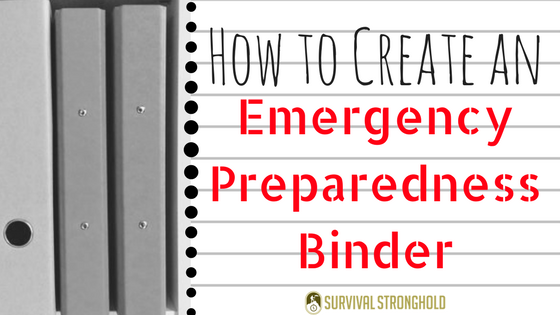In a disaster, all our easy-to-access digital information about all of our assets, utilities, and resources might vanish in an instant if communication grids go down. We also might find ourselves in quite a precarious situation very quickly if we don’t have important physical documents we normally keep somewhere safe in our house and never really think about.
If our houses are damaged or destroyed, or we have to evacuate quickly without much notice, we might lose a lot of important information and documents in the process.
Here is how to create an emergency preparedness binder that you can grab if you have to leave your home quickly that will have all your important information in it.
What to Use
You can use whatever you like, of course, but a simple 3-right binder with plastic zipper pouches to keep things safe will be ideal. You can probably build this entirely out of supplies you’ve purchased at Dollar General.
Documentation
First, you will probably want your vital records all stashed in this binder. You can use copies or the original, that is up to you. But make sure you have either copies or hard copies of you and your family’s:
- birth certificates or adoption records
- social security cards
- passports
- state-issued IDs or driver’s licenses
- student IDs
- military records/IDs
- CCW/CCHL licenses
- vehicle title
- house title
- health care IDs
Utilities and Insurance
If your house is damaged or destroyed in the course of a disaster, you will want to make sure you have the following information in your emergency binder:
- Contact information for utility companies
- Contact information for insurance companies
- Account information
- Insurance records
Financial records
You will also want to make sure you have access to your financial records and information in this binder. It’s up to you how detailed you want to get, because this will of course already be something you’ll want to keep very safe once you’ve evacuated or, if the binder is stolen, it would be a goldmine for any aspiring identity thief. But make sure to include something that would help you access the following information:
- Bank account numbers
- Credit card numbers
- Bank/creditor contact information
Health
Make sure to include as well vital information regarding:
- Health insurance information
- Immunization records
- Prescription records
- Medical allergies
- Any relevant medical records
Other vital records:
Other important documents you might want to include, if relevant:
- marriage licences
- pet information
- wills
- power of attorney information
- firearm registration/information
Try to think of anything else you might take for granted that you’ll have access to when disaster strikes. Imagine if your whole house was destroyed, what important documents and information would you lose? Or, if you couldn’t look something up on the internet, who’s phone number or what important account information would you lose access to?
You never know when you might have to prove who you are or need to remember vital medical information or personal history, so make sure you’re prepared to do this in a disaster.
If you enjoyed this, you might also like….


